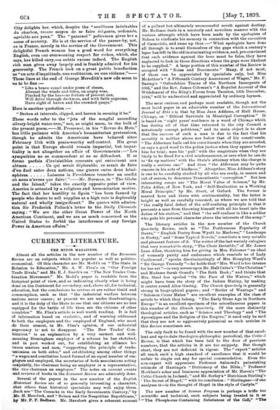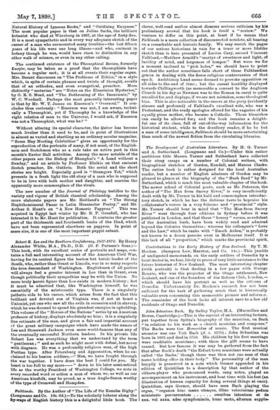CURRENT LITERATURE.
THB MINOS MI■GAZINEB.
Almost all the articles in the new number of the Economic Review are on subjects which are popular as well as politico. 'economical Of this character are Mr. Medd's on "The State in Relation to Education," Mr. A. W. Flux's on "Our Foreign Trade Rivals," and Mr. E. J. Smith's on "The New Trades Corn. bination Movement." Mr. Medd's paper is readable from the .historical point of view, and as indicating clearly what is being .done on the Continent for secondary, and, above all, for technical, education, but the conclusions he arrives at are rather timid and commonplace, such as that "the industrial warfare between mations never ceases ; at presPnt we are under disadvantages, and it is the duty of the State to see that our citizens are no less 'equipped for the battle of life than are the citizens of other countries." Mr. Flux's article is well worth reading. It is fall of information based on statistic, and of warning addressed to both the employers and the employed of England, who must .de their utmost, in Mr. Flux's opinion, if our industrial 'supremacy is not to disappear. "The New Trades' Com- bination" is an explanation by a very earnest and well- -meaning Birmingham employer of a scheme he has sketched, and in part worked out, for establishing an alliance be- tween masters and men, "supporting the principle of trade- 'unionism on both aides," and establishing among other things -"a wages and ooncliation board formed of an equal number of ern- .ployers and employed, the secretaries of both associations acting conjointly, the chairman being an employer or a representative, 'the vice chairman an employee." The notes on current events And reviews of books in the Economic Review are admirably done.
Several of the papers in the new number of the English _Historical Review are of so generally interesting a character, .that others than historical specialists may well enjoy them. -Such are "The Cossacks in the Early Seventeenth Century," by lir. H. Havelock, and "Nelson and the Neapolitan Republicans," by Dir. F. P. Badham, Mr. Havelook gives a coherent account of a gallant but ultimately unsuccessful revolt against destiny. Mr. Badham deals in a masterly and merciless manner with the various attempts which have been made by the apologists of Nelson to vindicate his memory in connection with the execution
of Caracciolo, and sums up thus What apologists have done all through is to avail themselves of the gaps which a century's lapse has left in the old incriminating evidence, and, pre-convinced that such evidence against the hero must be false, they have neglected to look in those directions where the gaps were likeliest to be supplied." A large portion of this number of the Review is occupied with "Notes and Documents." Many, if not moat, of these can be appreciated by specialists only, but Miss McArthur's "A Fifteenth Century Assessment of Wages," Mr. F. Baring's "Oxfordshire Traces of the Northern Insurgents of 1065," and the Rev. James Coleman's "A Royalist Account of the Withdrawal of the King's Forces from Taunton, 13th December, 1644," will be understood and appreciated by ordinary laymen.
The most curious, and perhaps most readable, though not the most lucid paper in an admirable number of the International Journal of Ethi -a is that by Miss Jane Addams, of Hull House, Chicago, on "Ethical Survivals in Municipal Corruption." It is based on "eight years' residence in a ward of Chicago which has during all of that time returned to the city Council a notoriously corrupt politician," and its main object is to show that the success of such a man is due to the fact that his morality is neither above nor below that of his constituents. " The Alderman bails out his constituents when they are arrested, or says a good word to the police justice when they appear before him for trial ; uses his pull' with the magistrate when they are likely to be fined for a civil misdemeanour, or sees what he can do to fix up matters' with the State's attorney when the charge is really a serious one." And then "the Alderman may be quite sincere in his acts of kindness." Altogether, Miss Addams's story is one to be carefully studied by all who are ready, in season and out of season, to denounce Transatlantic "corruption." Not less interesting essays are "The Moral Value of Science," by Mr. Felix Adler, of New York, and "Self-Realisation as a Working Moral Principle," by Mr. Sturt, of Oxford. The former is marred here and there with sentimentality, but the latter is bright as well as carefully reasoned, as where we are told that "the really fatal defect of the self-realising principle is that it prevents a man from throwing himself with all his heart into the duties of his station," and that "the self-realiser is like a soldier who puts his personal character above the interests of the army."
'The literary articles in the new number of the Church Quarterly Review, such as "The Posthumous Popularity of Dante," "English Poetry from Wyatt to Marlowe," "Landscape in Poetry," and "Some Typical Novels," constitute a very notable and pleasant feature of it. The writer of the last warmly eulogises that very remarkat.le story, "The Choir Invisible," of Mr. James Lane Allen, thanking him for giving in Mrs. Falconer "an ideal of womanly purity and endurance which reminds us of Lady Castlewood ; " speaks discriminatingly of Mrs. Humphry Ward's " Sir George Tressady "—he holds that "Mrs. Ward is too intense for her art "—is very severe upon Mr. Hall Caine's "The Christian" and Madame Sarah Grand's "The Beth Book ;" and thinks that Mrs. Steel has spoiled "On the Face of the Waters," which might have been the story of the Indian Mutiny, by making it centre round Alice Gissing. The Church Quarterly is generally strong in biographical papers ; and "Butler of Wantage " and "Solomon Ctesar Malan " are excellent examples of the class of article to which they belong. "The Early Stone Age in Northern Europe" is an excellent specimen of the miscellaneous papers in this number of the Church Quarterly. Of the more distinctly theological articles, such as "Science and Theology" and "The Apocalypse and the Religion of the Empire," it need only be said that they are not so aggressively polemical as such articles in this Review sometimes are.
The only fault to be found with the new number of that excel- lent and up-to-date theologico-philosophie periodical, the Critic ,1 Remew, is that which has been laid to the door of previous numbers, that the articles in it are too snippety. But though short, they are not deficient in vigour. The " expert " articles all reach such a high standard of excellence that it would be unfair to single out any for special commendation. Even the non-expert will appreciate Professor Salmond's painstaking estimate of Hastings's "Dictionary of the Bible ; " Professor Herkless's sober and luminous appreciation of Mr. Heron's "The Celtic Church in Ireland ; "and Mr. Sorley's " Hutchison Stirling's The Secret of Hegel,'" with its conclusion : " Stirlingese—if one analyses it—is the thought of Hegel in the style of Carlyle."
The new number of Science Progress is perhaps a trifle too scientific and technical, such subjects being treated in it as "The Phosphorus Containing Substances of the Cell," "The
Natural History of Igneous Rocks," and "Oxidising Enzymes." The most popular paper is that on Julius Sachs, the brilliant botanist who died at Wilrzburg in 1897, at the age of forty-five. It is a most sympathetic and in every way adequate sketch of the -career of a man who surmounted many troubles—the last fifteen years of his life were one long illness—and who, eminent in botany though he was, would have risen to distinction in any other walk of science, or even in any other calling.
The continued existence of the Theosophical Review, formerly Lucifer, may be taken as a proof that the theosophists have become a regular sect; it is at all events their regular organ. Mrs. Besant discourses on "The Problems of Ethics," in a style which, in spite of certain phrases and twists of thought, recalls that of an orthodox, and even evangelical, preacher. More distinctly " sectarian " are "Notes on the Eleusinian Mysteries," by G. R. S. Mead, and "The Dethroning of the Inanimate," by W. C. Wordsell. Perhaps the most generally interesting paper is that by Mr. W. T. James on Emerson's " Oversoul." It con- cludes thus curiously: " Emerson was not, I am aware, techni- cally a Theosophist, yet if Theosophy be a knowledge of the right relation of man to the Universe, I would ask, if Emerson was not a Theosophist, what was
Without altering its special character, the Quiver has become much livelier than it used to be, and in point of illustrations is almost as varied and startling as an ordinary secular magazine.
• " Some May Meeting Celebrities" gives an opportunity for the reproduction of the portraits of many, if not most, of the English- men and Scotchmen who as a rule take an active part in this month's Exeter Hall activities. Among the more notable of the other papers are the Bishop of Shanghai's "A Land without a Sunday," and an article by Professor Blaikie on that eminent Scotch preacher, Dr. Guthrie. Both the serial and the short stories are bright. Especially good is "Strangers Yet," which presents in a fresh light the old story of a man who is supposed to be in love with both mother and daughter, and marries the apparently more commonplace of the rivals.
The new number of the Journal of Philology testifies to the variety and vigour of British classical scholarship. Among the more elaborate papers are Mr. Heitland's on "The Strong Hephthemimeral Pause in Latin Hexameter Poetry," and Mr. Arthur S. Hunt's on "A New Homeric Papyrus." This was acquired in Egypt last winter by Mr. B. P. Grenfell, who has intrusted it to Mr. Hunt for publication. It contains the greater part of the thirteenth and fourteenth books of the Iliad, which have not been represented elsewhere on papyrus. In point of mere size, it is one of the most important papyri extant.







































 Previous page
Previous page